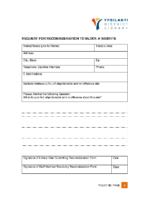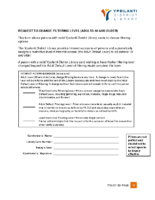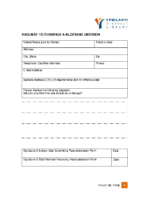B3
INTERNET ACCESS
Approved: 09/28/2000
Revised by the Ypsilanti District Library Board of Trustees May 23, 2002
Revised by the Ypsilanti District Library Board of Trustees July 29, 2004
Revised by the Ypsilanti District Library Board of Trustees August 25, 2005
Revised by the Ypsilanti District Library Board of Trustees September 29, 2011
Revised by the Ypsilanti District Library Board of Trustees April 19, 2012
Revised by the Ypsilanti District Library Board of Trustees March 28, 2018
Table of Contents
I. Internet Access
II. Internet Filtering
III. Procedure for Use
IV. Guidelines for Responsible Use
V. Sanctions
VI. Right of Appeal
Internet Public Access Policy
I. Internet Access
A. Internet Access. The Ypsilanti District Library (“YDL” or “Library”) provides a broad range of information resources, including those available through the Internet. Access to the Internet greatly expands YDL’s information services beyond traditional collections and resources. We make this service available in support of our mission “to promote lifelong learning” and “to provide access to information in a variety of formats.”
B. Validity of Information. The Internet offers access to many valuable local, national, and international sources of information; however, it is an unregulated medium and not all sources on the Internet provide accurate, complete, or current information. YDL staff neither monitors nor controls information accessed through the Internet and is not responsible for its content, quality, accuracy, or currency. Internet users will need to evaluate for themselves the validity of information found.
C. Policy Application. Internet resources accessible through YDL are provided fairly and equitably to all Library users. This policy applies to the workstations at the Library as well as the wireless access provided at the Library.
D. View Internet at Own Risk. The Internet may contain information that is controversial, sexually explicit, or offensive to some patrons. Because of this and the fact that access points on the Internet can and do change often, rapidly and unpredictably, the Library cannot protect individuals from information and images which they might find offensive, disturbing or inaccurate. Library patrons use the Internet at their own risk. Parents or guardians of minor children are responsible for their child’s use of the Internet through the Library’s connection as stated more fully below.
E. No Liability. The Library assumes no responsibility for any damages, direct or indirect, arising from its connections to the Internet. Patrons shall use Library computer hardware and software at their own risk. The Library is not responsible for equipment malfunction, loss of data, any damages to the user’s disks, data, or electronic transactions of any type. The Library is not responsible for the loss of any portable media.
F. Respect Others. Because Library users of all ages, backgrounds and beliefs are using computers or using public space in the view of computers, Library patrons are asked to be sensitive to other’s values and beliefs when accessing potentially controversial information and images. Users shall not cause a nuisance by intentionally exposing minors or other patrons to potentially controversial information and images.
II. Internet Filtering
A. Internet Filtering – General
- Filtered Access. In order to comply with the requirements of the Children’s Internet Protection Act (“CIPA”) and Michigan’s Public Act 212 of 2000 (“PA 212”), all computer terminals are filtered. Further, the Library’s wireless access is also filtered. Filtered access means the computer or wireless system has a program installed that is designed to restrict minors from receiving obscene material or sexually explicit material that is harmful to minors as defined by PA 212 and visual depictions that are obscene, child pornography or harmful to minors as defined by CIPA.
- Safety of Minors Regarding E-Mail: The Library does not filter e-mail or other direct electronic communications. It is the responsibility of the parent or guardian to educate the minor on safety and security and monitor the use of these communications.
- More Restrictive Filtering Requests. Patrons may request a more restrictive filtering level by identifying the desired restrictive filtering level on the Request to Change Filtering Level form provided by the Library.
- Request to Block a Website. Further, the technology is not able to block all sites that patrons may deem obscene or harmful to minors. Individuals who believe an accessible Internet site should be blocked and made unavailable by the filter can request that the site be added to the list of sites filtered by completing a Request for Reconsideration to Block a Website made available at each YDL location and online. The completed form should be forwarded to the Library Director, who will prepare a written reply to the individual submitting the form. The decision may result in maintaining the same status or applying a different level of filtering to the site.
B. Internet Filtering – Patrons 18 Years of Age or Older.
- Request Less Restrictive Filters. Patrons 18 years of age or older may request to have the filters changed to a less restrictive filtering level for bona fide research or other lawful purposes by completing the Request to Change Filtering Level form provided by the Library.
- Unblock Sites. Individuals 18 years of age or older who believe an Internet site has been improperly blocked can request that the site be “unblocked” by completing a Request Override Blocking Decision form made available at each YDL location or online. A decision on the site’s status will be made by the Director, who will prepare a written reply to the individual submitting the form.
C. Internet Filtering — Patrons Under 18 years of Age.
- Responsibility of Parents and Legal Guardians. As with other materials in the Library’s collection, it is the Library’s policy that parents or legal guardians are responsible for deciding which library resources are appropriate for their children. The Library urges parents and guardians to discuss Internet use with their children and to monitor their use of this educational tool. In order to assist parents and guardians, YDL will provide a youth-friendly homepage on youth department computers to direct patrons to age-appropriate Internet sites, both recreational and academic in nature. Parents and youth patrons are encouraged to participate in YDL’s training offered on Internet use that explains both the benefits and pitfalls inherent in its use.
- Request Least Restrictive Filters. Minors who are 17 years old may only have the filtering level (filters used to filter visual depictions of obscenity, child pornography and material that is deemed harmful to minors) changed on a computer used by that patron if they complete the Request to Change Filtering Level form for (1) bona fide research or other lawful purposes and (2) only if a parent or legal guardian has accompanied them to the Library and is sitting at the computer station or terminal at all times. Patrons under the age of 17 may not use unfiltered workstations for Internet access pursuant to the requirements of CIPA.
- Unblocking Websites. Patrons under the age of 18 may request in writing on the Request to Override a Blocking Decision form provided by the Library that a particular site be unblocked, but only if the site does not include obscene or sexually explicit material deemed harmful to minors or other material prohibited by law.
III. Procedure for Use
1. Procedure.
a. Patrons wishing to access the Library’s workstations must have a Library Card or purchase a guest pass.
b. Internet access is available on a first-come, first-served basis.
c. Library card holders may sign up to use an Internet station for a period of 60 minutes. Time will renew unless there is a waiting list.
d. Users who have purchased a guest pass may sign up to use an Internet station for a period of 60 minutes. The guest pass is good for up to 3 hours on the day of purchase, when no one is waiting.
e. A waiting list will be created if all computers are in use.
2. Availability. The public computers are only available for use by Users if they are not being used for Library purposes, such as classes, staff training or special programs. The Library reserves the right to have first priority of use for Library uses, sponsored events or co-sponsored events.
3. Closing. All computers and printers are shut down ten (10) minutes before the Library closes.
Reimbursement for printing. The User shall reimburse the Library ten ($.10) cents a page for black and white printing and twenty-five ($.25) for color printing. The User shall be responsible for all printing costs, so Users are encouraged to review print jobs and costs prior to printing.
IV Guidelines for Responsible Use
1. Lawful Use. The Library Internet connection and workstations shall be used in a lawful manner. The Library’s Internet and workstations cannot be used for any fraudulent or unlawful purpose prohibited under any applicable federal, state or local law, including, but not limited to, accessing material that can be classified as obscene or child pornography.
2. Intellectual Property. Users may not violate copyright laws, software licensing agreements, and all other intellectual property rights. Responsibility for any consequences of copyright infringement lies with the User. The library expressly disclaims any liability or responsibility resulting from such use.
3. Personal Software Prohibited. Users may not use personal software or alter any system or network configuration. The attachment of unauthorized equipment to the library’s computers and networks is strictly prohibited. Any cause of the degradation of system performance is subject to punishment.
4. Use Must Not Be Harmful to Minors. Michigan law prohibits users from allowing minors access to sexually explicit materials harmful to minors. Internet Users shall not permit any minor to view sexually explicit material or any other material deemed harmful to minors.
5. Privacy; Unauthorized Use. Users may not violate another user’s privacy by misrepresenting oneself as another user; by attempting to modify or gain access to files, passwords or data belonging to others; and by seeking disallowed access to any computer system via the Internet.
7. Prohibited Uses. Users may not deliberately propagate computer viruses. Users may not distribute unsolicited advertising or propaganda.
8. Damage. The User shall be responsible for repayment of any costs to the Library for damage to the computer terminals or system.
9. Compliance with Policy. The same rules apply to the use of the Internet as with the use of any other Library materials. The Library has adopted a Patron Behavior Policy. All Internet Users must comply with the Library’s Patron Behavior Policy, which shall be posted in the Library.
IV. Sanctions
Violations of Internet Use Policy.
The Library Director or the Director’s designee may restrict access to Library facilities by (1) terminating or limiting computer internet access at library facilities; (2) immediately dismissing the patron from the premises; (3) suspending the patron’s access to library facilities for a set period of time; or (4) by denying access to specific services and/or programs pursuant to this Policy. If necessary, the local police may be called to intervene.
A. Incident Reports. Library Staff shall record in writing in the form of an Incident Report any violation of this Policy that resulted in a verbal warning or a suspension of library privileges. Within 24 hours of the incident’s occurrence, an Incident Report shall be written and included in the security log. The report should include physical descriptions in addition to the name of the patron. A copy of the Notice of Patron Suspension should be attached, if applicable.
B. Violation of the Policy – Suspension of Privileges. Unless otherwise provided in this Policy, (See Section C below), the Library shall handle violations as follows:
- Initial Violation: Library patrons observed violating this policy will be asked to cease the violation with a verbal request. If the patron does not comply with the request, he or she will be asked to leave the building for the day. If he or she refuses, police may be called.
- Subsequent Violations: The Director or the Director’s authorized designee may further limit or revoke the patron’s library privileges if infractions continue. Such limitation or revocation shall be in writing specifying the nature of the violation. Subsequent violations shall result in additional suspensions of increasing length.
C. Violations that Affect Safety and Security. Per the Patron Behavior Policy, violations involving violations of law (including child pornography), violence, threatening behaviors, verbal abuse, drug sale or use or attempted drug sale or use, intoxication, sexual harassment, vandalism, theft or attempted theft, sexual misconduct or any behavior that threatens the safety and security of staff and/or patrons shall be handled as follows:
- Initial Violation: The police will be called immediately. If the conduct constitutes a violation of local, state, or federal law, arrest or criminal prosecution may ensue. Violations of this nature will result in an immediate minimum two-week suspension of library privileges. The Incident Report shall specify the nature of the violation.
- Subsequent Violations: The police will be called immediately. If the conduct constitutes a violation of local, state, or federal law, arrest or criminal prosecution may ensue. The Director or the Director’s authorized designee, may further limit or revoke the patron’s library privileges in escalating responses, which will be documented in writing. Subsequent violations will result in additional suspensions of increasing length.
D. Reinstatement. The patron whose privileges have been limited or revoked may be required to attend a meeting with the Director or the Director’s designee to review the Library Patron Behavior Policy before their privileges may be reinstated. The Director or his or her designee may attach conditions to such reinstatement and shall provide written notification of those conditions and the duration of the conditions.
E. Civil or Criminal Prosecution. Illegal acts involving the Library’s Internet access service may be subject to civil or criminal prosecution.
V. Right of Appeal
Patrons may appeal a decision to (1) limit or revoke privileges or (2) attach conditions to reinstatement by sending a written appeal to the Library Director within 10 business days of the date the privileges were revoked or limited or the written statement of conditions was provided. The Library Board shall hear the appeal. The decision of the Library Board is final.
Forms referenced in this policy:




